Featured Farmer:
Denise Stalder from Erlengrabenli
in Ontario, Canada
Learn more about Denise’s story and listen to her on The Urban Farm Podcast here!
Tell me a little about your urban farm. What’s its name? Size?
My farm is technically suburban I guess, since I am just walking distance from town. We call it Erlengrabenli. My husband’s family has had a farm for many generations in Switzerland named Erlengraben (Willow ditch). Our name means “Little Erlengraben” as a tribute to that tradition. We have 1.6 acres, some of which is landscaped with old Sugar Maples. The vegetable garden itself is about 1500 square feet of raised beds.
What are you growing?
This is just our second growing season here. I am growing a wide variety of vegetables and flowers. I plan to use the first few years here as a test period, to see what grows well in the conditions available. Currently I have garlic, peas, shallots, strawberries, radishes, beets, carrots, celery. Cabbage, kale, cauliflower, broccolini, onions, tomatoes, hot and sweet peppers, cucumbers, summer and winter squash including pie pumpkins, beans (snap and drying types), leeks, and lots of fresh herbs. My veggie garden has a mix of flowers as well, such as snapdragons, cosmos, poppies, calendula, dahlia, bee balm, and borage. These really bring in the pollinators. I grow from mostly organic and heirloom seeds.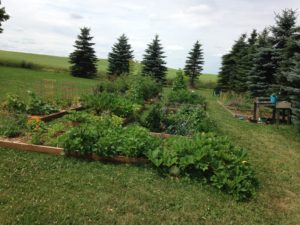
What kind of climate are you growing in?
The climate in this region can be harsh, and is a full growing zone colder than our previous properties (zone 4). It is quite open so the winds are often strong. In fact, the surrounding area is used by the Provincial Government for wind farms. We have found the wind can also be a blessing though. We experience very little fungal disease thanks to the drying effect of the constant breeze. The winters are very long and cold, but the deep snow also acts as a great insulator, and with a little mulching we have successfully wintered over our perennial herbs.
What initially got you interested in urban farming?
I have always been interested in growing food, but I think the dream of having a large garden goes back to my teenage years. When I was 14 I started dating a guy whose father had a very large vegetable garden. The family did not have a great deal of money to throw around, but they always welcomed all of the children’s friends into their home, and fed them from the garden. That garden allowed them to be so much more generous and hospitable than they would have otherwise been able to afford, and this made such a strong impression on me at that age. I also saw how working in the garden brought such peace to the father. He worked long hours at a very physical job, but he would come home and head straight out to the garden. I believe it was his way of unwinding, and celebrating what he was able to achieve thanks to his hard work.
In more recent years I read Michael Pollan’s “Omnivore’s Dilemma” and, after discovering Joel Salatin, went looking for every Youtube video and TedTalk I could find on the subject of improving the soil. I just wanted to get my hands dirty.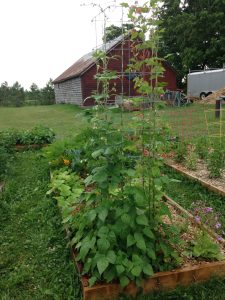
Do you use any organic, permaculture, hydroponic, biodynamic, or other methods? Explain.
Before we bought this property, I leased 1000 square-foot plot from an organization called FarmStart. They are a non-profit group here in Ontario that was established to assist new farmers to get access to growing land and mentoring from seasoned experts. Besides the ¼- to 4-acre plots that were the center of that program, they also made available to the general public about 15 of these community plots. They provided the space fully tilled and ready to plant, access to water, and a yard of compost. The only stipulation was that only organic methods and seeds/seedlings could be used, as the farm itself was certified organic. They take great pride in promoting organic vegetable farming as well as pasture raised meat animals. I have always tried to use organic methods in my gardens, but this program really helped me to learn some great ideas for prevention of disease, pests, and organic composting. These are the only methods that I use in all of my gardens.
Do you use compost? Where do you get it and how does it help your plants?
I have a three-section compost system built from old freight skids that works very well. I started it last Fall with leaves from our trees and garden waste, and was able to get a small batch of good finished compost this summer. I now have two sections filled with compost at different stages of decomposition, and try to keep one section free for turning into. I am adding the bedding from my chicken coop this year, so I expect that next year’s finished compost will be even better. I also grow stinging nettle and borage, strictly for pollinators and to add to my compost pile. My goal is to be able to top up each of my raised beds every Spring with this compost. As well, I will experiment this year with a cover crop of red clover on two of my larger beds.
Do you have any urban livestock? Chickens? Bees?
This year we got eight day-old chicks at the end of April. They have been one of the most rewarding things we have ever done. We are continually amazed at the personalities they have and how much they enjoy interacting with us too. We are looking forward to eggs, hopefully in September, but even without the bonus of this organic protein source, I would still want to raise chickens. They are beautiful creatures.
Next Spring, we are hoping to take on a hive of bees. We have a contact that rescues wild swarms and will give us one if we get everything prepared to receive them. My winter reading will be all about bees!
What do you do with the food you grow?
We try to make as much of our diet come from our own garden as possible, and keep our children’s families supplied. Last year was the first time I tried canning, and it was a great success. Besides my usual freezing of peas, beans, pumpkin, and tomato sauce, I canned beans, beets, pickled beets, dills, and several kinds of jam. I made sauerkraut from some of my cabbages.
When we bought the property, we planted two apple trees. One is a grafted tree with 3 varieties of apples, and one is a tree I started from the seeds of a heritage tree just to see what the apples would turn out like. I find it so fascinating that you never know what you will get from an apple seed. The first spring we got a big surprise when we found out there was an apple tree up by the house. It is a very nobbly old specimen that is probably almost as old as the house, which was built in 1901. We hadn’t seen any apples when we viewed the property, but last year the tree was absolutely loaded with early apples. I canned many jars of applesauce, made homemade cider vinegar, and froze pie fillings and slices for the winter. We just recently ate the last of those pie fillings with some visitors from Switzerland. Unfortunately, this year the tree did not produce a single apple. I think the poor thing is just exhausted, and we will wait patiently for another bumper year somewhere down the road.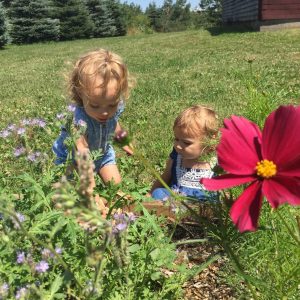
What is your greatest challenge in your farming endeavors?
My first instinct is to say that weather is my biggest challenge, but maybe that isn’t true. I have become pretty good at making impromptu shelters to save my plants from frost and starting seedlings indoors to beat the season. My biggest challenge is probably forcing myself to space my plants properly and thin seedlings. I have a terrible habit of trying to squeeze in just one more plant, and I absolutely hate thinning, not because it is fiddly work but because I can’t stand killing the little plants. I watched a documentary once about the way plants communicate, and it left me feeling like a murderer every time I prune or thin. My daughter tells me I need to get farm-strong.
What do you enjoy the most about farming/growing food?
I love every moment I spend in the garden. It makes me feel connected to the living world, and so much more appreciative of the changing seasons and the resilience of nature. We have so much to learn from the plants and insects in our garden. I also really, really love the food!
Why do you think urban farming is important?
My career was spent in the transportation industry, and it left me with a clear idea of just how quickly supply chains can break down. This made me want to grow my own food to ensure that I will always have a healthy supply for my family. I think this should be a consideration for everyone. I do not believe that the current system of importing food to the extent that we do in North America is sustainable. If everyone grew a bit of their own food, they would be more aware of how fragile this system is, and would be more likely to support their local producers. It is also environmentally important. We have to start growing soil in Canada and the US instead of building over prime farmland with homes and shopping malls.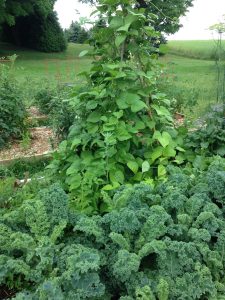
Do you think this is a growing movement?
I truly believe this is a growing movement. I have been pleasantly surprised by the interest that friends and colleagues have shown in what we are doing. I am sure they thought we were crazy when we bought this property, but now they are lining up to buy any overflow we have. We tell anyone who will listen about the importance of knowing what is in your food, and the only real way to know is by growing it yourself. I think a lot of young parents now are looking to organic produce, and home grown food, to combat some of the health issues facing their children.
Is urban farming the future of agriculture?
I sincerely hope that this will be the future. I think the combined forces of economics and biosecurity will continue to make this a more attractive option to people. The current commercial farming and livestock systems are taking a real beating lately in the press, and I am happy to see it. I do believe though that our respective governments need to support farmers better, so that they are able to make the changes necessary to switch to organic and polyculture farming.
Do you have any advice for someone that’s just getting started?
Just do it! Start however small you need to, even if it is just a single tomato plant in a pot, and you will be hooked after you taste your first homegrown tomato. Don’t be afraid of failure. Even experienced gardeners will have some failures every season, but you just learn from them and carry on.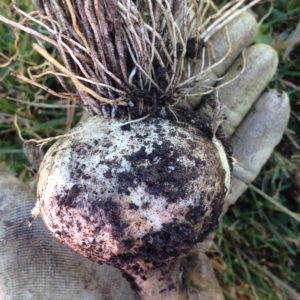
Anything else you’d like to add?
My message these days is for people to see that urban or small-scale farming are great options for retirement. When I was packaged out at 57, I was devastated. It left me second-guessing everything I thought I knew about who I was, and my abilities. That happened in the Fall, so gardening wasn’t an option in Ontario. I started walking every day, for many kilometers, just letting myself think and working off some of the frustration. As I walked, I became very aware of the changing season. The farmers markets were full of beautiful produce, and I could see people’s backyard gardens brimming with ripe fruits and vegetables. It really inspired me, and I started thinking that this was where I wanted my life to go next. I knew it would involve some big financial sacrifices, but the more I thought about it the more I could see the advantages of trying to live this way. As we grow older, we need physical exercise, mental exercise, and nourishing food to maintain our health and mobility. Gardening on a bigger scale gives me all of these things. I hate the gym, but love to work physically hard, so digging, planting, and harvesting are right up my alley. Even if someone doesn’t like the physical challenge though, you can design your gardens to be as little or as much work as you can handle. I spend a lot of time reading and connecting with online sites, such as this one, to learn everything I can about, plants, nutrition, the environment, and natural health. Learning new skills helps keep my brain sharp. Caring for the chickens gives my life routine and immeasurable spiritual reward. I love those birds, and they make me happy.
I have found an incredible sense of community through this endeavor, and many of the people I follow or communicate with live all over the world. Through sites like yours Greg with Urban Farm, and people like Marjory Wildcraft, Nathan Crane, Justin Rhodes, Sharon Peterson, Mark Abbott-Compton in the UK, and James and Laurentine of FMTV from Australia, I feel like I have this wide group of “friends” who believe in the things I do and are there to help me whenever I need advice with gardening or livestock information. The old days of feeling isolated in retirement are no longer necessary when these resources are available at so little cost, usually only an inexpensive laptop and the monthly internet fees.
This is a very rewarding lifestyle that is economically feasible for almost anyone, and supportive of all aspects of your health.
I hope if more people reaching retirement age consider this as an option, it will set an example for the generations coming up. One of the highlights of my year was when my 7 year-old granddaughter told me she couldn’t wait for summer so she could pick some of those yummy carrots from my garden.
*Disclosure:
Some of the links in our podcast show notes and blog posts are affiliate links and if you go through them to make a purchase, we will earn a nominal commission at no cost to you. We offer links to items recommended by our podcast guests and guest writers as a service to our audience and these items are not selected because of the commission we receive from your purchases. We know the decision is yours, and whether you decide to buy something is completely up to you.








We are partially doing this now, before retiring, and saving money to buy unimproved acreage that we will build a tiny house (or 4 if all 3 kids move too) and farm for what little we need to live. We are hoping to bring enough food in this year to avoid buying any produce for a year. If we can produce enough to avoid purchasing canned, frozen and fresh produce for most of the year we will have a few additional grand a year to fix the home we are in and save for permanent acreage.